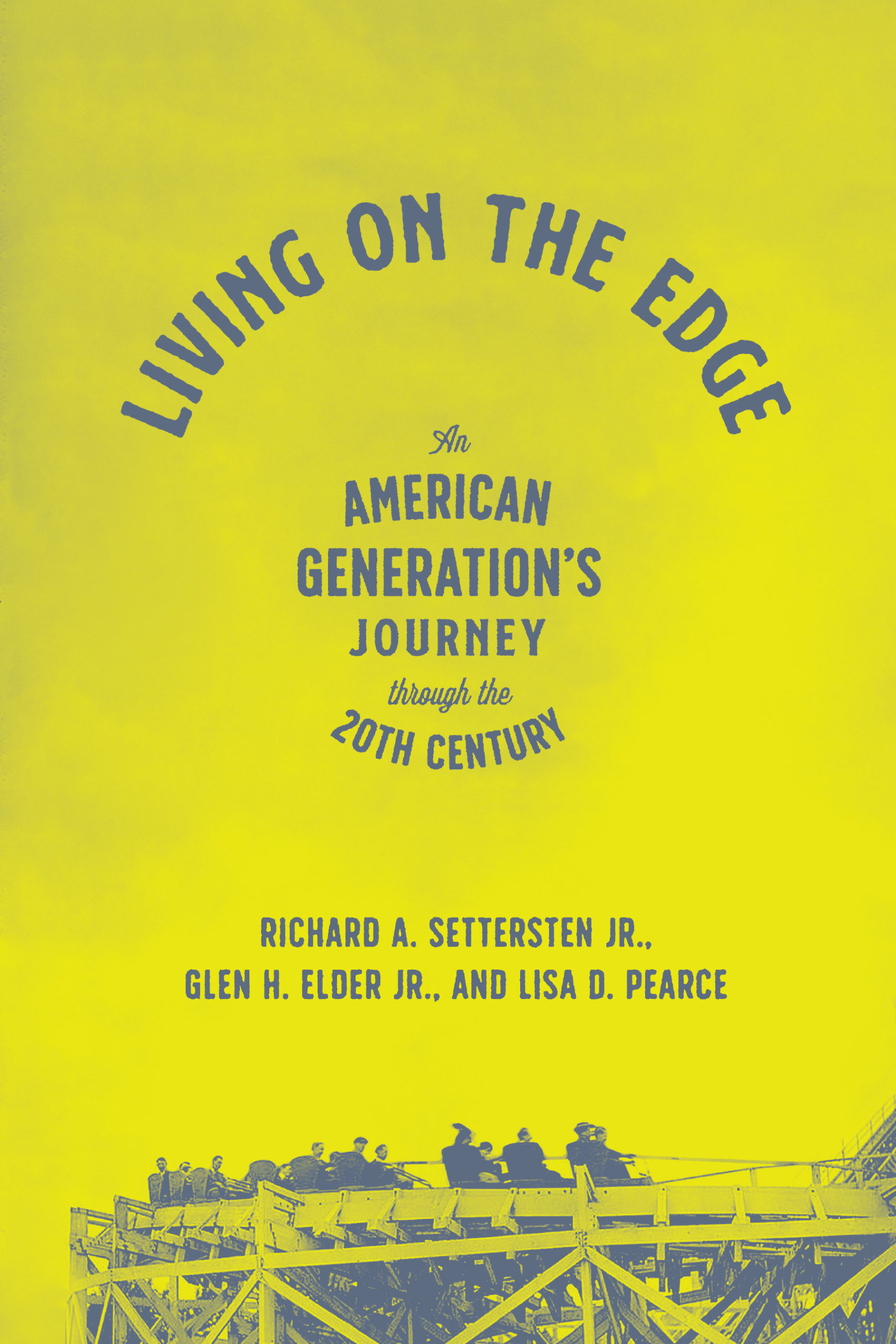recipient of the 2022 richard Kalish innovative publication award of the gerontological society of america
CHINESE AND JAPANESE EDITIONS COMING IN 2025!
Living on the Edge
RICHARD A. SETTERSTEN, JR., GLEN H. ELDER, JR., & LISA D. PEARCE
Trade, Non-Fiction, 2021
Historical events shape our sense of self and profoundly affect the course of our individual lives. When we think of the radical changes that transformed America during the twentieth century, our minds often focus on the fifties and sixties: the Civil Rights Movement, changing gendered expectations, and new economic opportunities and challenges that represented major turning points. But these were not the only changes that shaped our world. In Living on the Edge, we learn how rapid social change and disruptions also defined the lives of Americans born at the turn of the century. The changes they cultivated and witnessed greatly influenced their lives and our world as we understand it today.
Drawing from the iconic longitudinal Berkeley Guidance Study, Living on the Edge reveals the hopes, struggles, and daily lives of the 1900 generation. Most surprising is how relevant and relatable the lives and experiences of this generation are today, despite the gap of a century. From the reorganization of marriage and family roles and relationships to strategies for adapting to a dramatically changing economy, the trials faced by this earlier generation echo and amplify our own time. Living on the Edge offers an intimate glimpse into not just the history of our country, but the feelings, dreams, and fears of a generation remarkably kindred to today’s.
Living on the Edge presents a singularly creative example of the power of the life-course perspective to provide a unique and compelling account of how the lives of Americans in the 1900 generation were shaped by the rapidly changing world … In what is certain to be regarded as a classic, the study exemplifies how master scientists can illuminate the ways in which individual and context shape lives within each moment and across the life span.
– Richard M. Lerner, Tufts University
… [B]eautifully written, and, most important, fascinating, Living on the Edge teaches us about the rarely studied 1900 generation. This is the generation that made initial forays into major societal changes that emerged full-blown in the 1960s and 1970s, especially with respect to marriage and women’s rights and lifestyles. This book makes a unique and excellent contribution to literature.
– Linda K. George, Duke University
This is a remarkable culmination of a research project extending over a half-century, capturing nearly the entire lives of the Berkeley “1900” generation. Guided by bedrock principles of life course analysis, Living on the Edge shows how each phase of life must be understood in the context of the entire life course and its historical setting.
– Jeylan T. Mortimer, University of Minnesota
Living on the Edge is a must-read for all interested in the promises and perils of social change and how individuals adapt to rapid successions of boom and bust, entering an uncharted world.
– Ingrid Schoon, University College London
By looking to past generations, Living on the Edge offers remarkable insights into how disruptive social changes transform life course paths and possibilities in myriad unanticipated ways. A must-read for all of us living on the edge in these tumultuous times.
– Phyllis Moen, University of Minnesota
Americans of a century ago were much like those of today, facing an uncertain future while trying to make sense of the present … they often felt tremendous social change that was continuing to accelerate, reminding us, the authors write sagely, that “our lives are not our own but are embedded in family relationships and interactions that shape us.” A rewarding account that supports the adage that what’s past is prologue.
– Kirkus Reviews
Fascinating, …. thought-provoking, … beautifully written, … and engaging … Living on the Edge is an instant classic, and joins its companion studies American Lives and Children of the Great Depression as our field’s most influential studies of aging and the life course.
– Debby Carr, Boston University (The Gerontologist)
Highly recommended … an exciting read … gives a real sense of connection with the lives of those who have gone before … highly relevant in understanding the differential impact of national and global events on members of a society and the potential for lifelong consequences.
– Claire poppy, University of southampton (ageing & society)
… [A]n interesting way for historians to look inside multiple generations and families and view the dynamics that shaped family responses to world events … Living on the Edge provides a fascinating and detailed look into the lives of these Americans and how they navigated cultural and world events.
– Elizabeth Garner Masarik, SUNY (History)
Beautifully written … Living on the Edge is an important contribution to the study of human lives … it not only offers a retrospective on twentieth century history of the United States, but a close look as well at the issues and problems of a generation that are similar in many ways to those experienced by generations of today.
